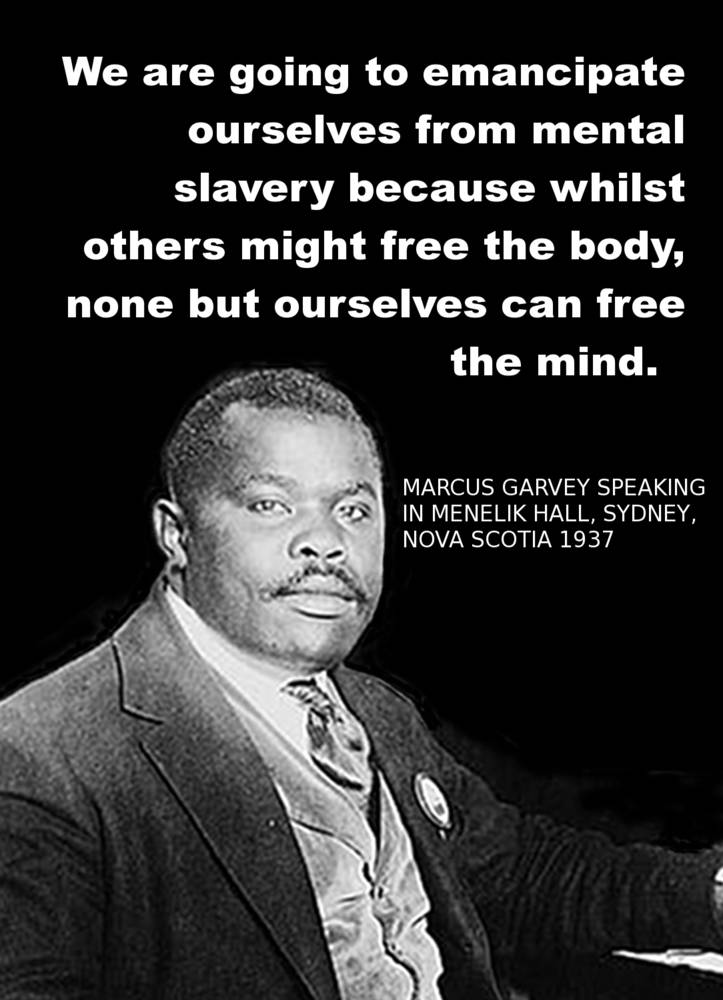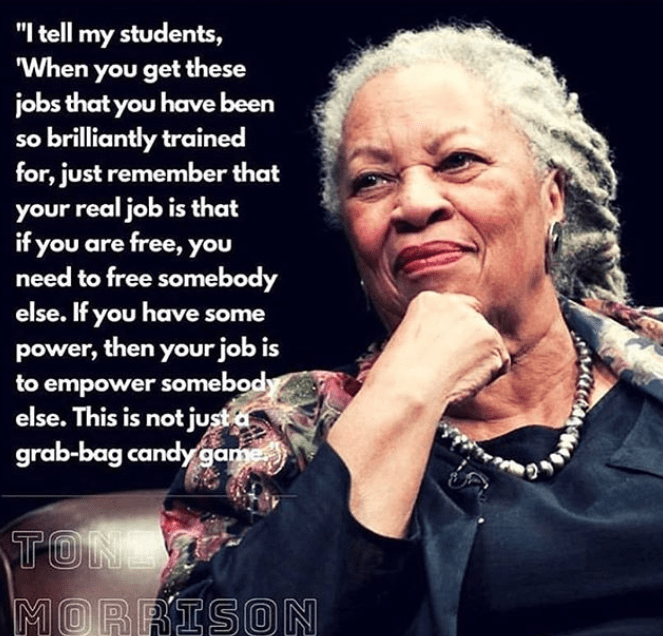Blog
https://www.youtube.com/watch?v=rgaSm8tQvAA&list=PLEB3LPVcGcWZ0hsQ5_jgSMhawAnDzy1io&index=2&t=24s
more...Also known as NGC 6523 or the Lagoon Nebula, Messier 8 is a giant cloud of gas and dust where stars are currently forming. At a distance of about 4,000 light years from Earth, Messier 8 provides astronomers an excellent opportunity to study the properties of very young stars. Many infant stars give off copious amounts of high-energy light including X-rays, which are seen in the Chandra data (pink). The X-ray data have been combined with an optical image of Messier 8 from the Mt. Lemmon Sky Center in Arizona (blue and white).
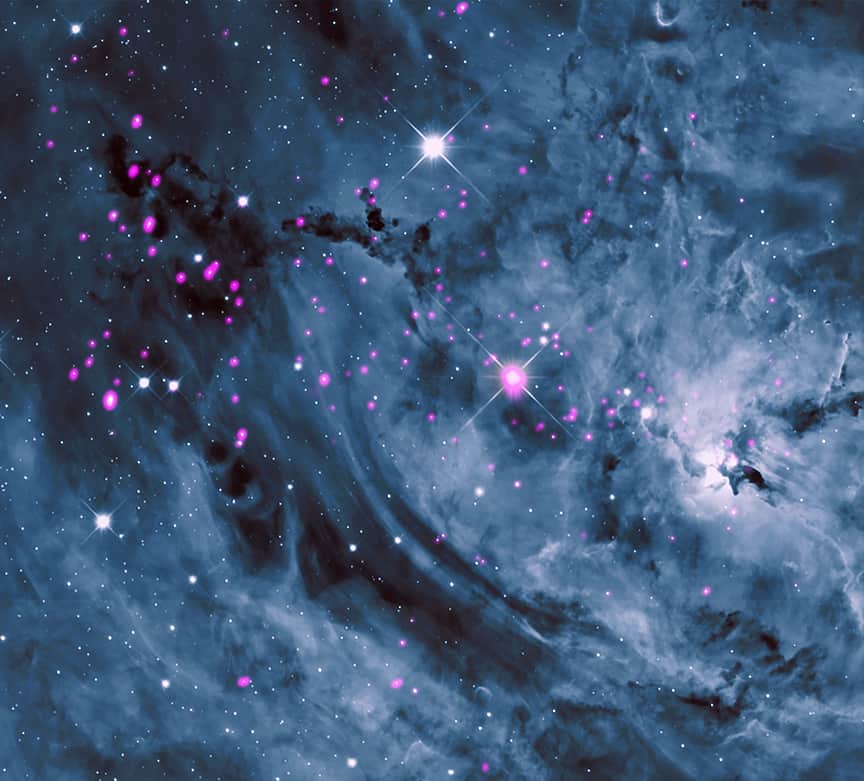
Don Van Vliet (/væn ˈvliːt/, born Don Glen Vliet; January 15, 1941 – December 17, 2010) was an American singer, songwriter, multi-instrumentalist, and visual artist best known by the stage name Captain Beefheart. He conducted a rotating ensemble called the Magic Band, with whom he recorded 13 studio albums between 1964 and 1982. His music blended elements of blues, free jazz, rock, and the avant-garde with idiosyncratic rhythms, absurdist wordplay, and his wide vocal range. Known for his enigmatic persona, Beefheart frequently constructed myths about his life and was known to exercise an almost dictatorial control over his supporting musicians. Although he achieved little commercial success, he sustained a cult following as a “highly significant” and “incalculable” influence on an array of new wave, punk, and experimental rock artists.
An artistic prodigy in his childhood, Van Vliet developed an eclectic musical taste during his teen years in Lancaster, California, and formed “a mutually useful but volatile” friendship with musician Frank Zappa, with whom he sporadically competed and collaborated. He began performing with his Captain Beefheart persona in 1964 and joined the original Magic Band line-up, initiated by Alexis Snouffer, the same year. The group released their debut album Safe as Milk in 1967 on Buddah Records. After being dropped by two consecutive record labels they signed to Zappa’s Straight Records, where they released 1969’s Trout Mask Replica; the album would later rank 58th in Rolling Stone magazine’s 2003 list of the 500 greatest albums of all time. In 1974, frustrated by lack of commercial success, he pursued a more conventional rock sound, but the ensuing albums were critically panned; this move, combined with not having been paid for a European tour, and years of enduring Beefheart’s abusive behavior, led the entire band to quit.
Beefheart eventually formed a new Magic Band with a group of younger musicians and regained critical approval through three final albums: Shiny Beast (1978), Doc at the Radar Station (1980) and Ice Cream for Crow (1982). Van Vliet made few public appearances after his retirement from music in 1982. He pursued a career in art, an interest that originated in his childhood talent for sculpture, and a venture which proved to be his most financially secure. His expressionist paintings and drawings command high prices, and have been exhibited in art galleries and museums across the world. Van Vliet died in 2010, having suffered from multiple sclerosis for many years.
more...Earl Zebedee Hooker (January 15, 1930 – April 21, 1970) was a Chicago blues guitarist known for his slide guitar playing. Considered a “musician’s musician”, he performed with blues artists such as Sonny Boy Williamson II, Junior Wells, and John Lee Hooker and fronted his own bands. An early player of the electric guitar, Hooker was influenced by the modern urban styles of T-Bone Walker and Robert Nighthawk. He recorded several singles and albums as a bandleader and with other well-known artists. His “Blue Guitar”, a slide guitar instrumental single, was popular in the Chicago area and was later overdubbed with vocals by Muddy Waters as “You Shook Me“.
In the late 1960s, Hooker began performing on the college and concert circuit and had several recording contracts. Just as his career was on an upswing, he died in 1970, at age 40, after a lifelong struggle with tuberculosis. His guitar playing has been acknowledged by many of his peers, including B.B. King, who commented, “to me he is the best of modern guitarists. Period. With the slide he was the best. It was nobody else like him, he was just one of a kind”.
Hooker was born in rural Quitman County, Mississippi, outside of Clarksdale. In 1930, his parents moved the family to Chicago, during the Great Migration of blacks out of the rural South in the early 20th century.
more...Eugene Bertram Krupa (January 15, 1909 – October 16, 1973) was an American jazz drummer, band leader, actor, and composer known for his energetic style and showmanship. His drum solo on “Sing, Sing, Sing” (1937) elevated the role of the drummer from an accompanying line to an important solo voice in the band.
In collaboration with the Slingerland drum and Zildjian cymbal manufacturers, he was a major force in defining the standard band drummer’s kit. Krupa is considered “the founding father of the modern drumset” by Modern Drummer magazine.
The youngest of Anna (née Oslowski) and Bartłomiej Krupa’s nine children, Gene Krupa was born in Chicago. Bartłomiej was an immigrant from Poland. Anna was born in Shamokin, Pennsylvania and was also of Polish descent. His parents were Roman Catholics who groomed him for the priesthood. He spent his grammar school days at parochial schools. After graduation he attended Saint Joseph’s College for a year but decided the priesthood was not his vocation.
Krupa studied with Sanford A. Moeller, and began playing drums professionally in the mid-1920s with bands in Wisconsin. In 1927 he was hired by MCA to become a member of Thelma Terry and Her Playboys, the first notable American jazz band—all-female bands excepted—to be led by a female musician. The Playboys were the house band at The Golden Pumpkin nightclub in Chicago and toured throughout the eastern and central United States.
Krupa made his first recordings in 1927 with a band under the leadership of Red McKenzie and guitarist Eddie Condon. Along with other recordings by musicians from the Chicago jazz scene, such as Bix Beiderbecke, these recordings are examples of Chicago style jazz. Krupa’s influences during this time included Father Ildefonse Rapp and Roy Knapp (both teachers of his), and drummers Tubby Hall, Zutty Singleton and Baby Dodds. Press rolls were a fairly common technique in the early stages of his development. There were many other drummers (Ray Bauduc, Chick Webb, George Wettling, Dave Tough) who influenced his approach to drumming and other instrumentalists and composers such as Frederick Delius who influenced his approach to music. Krupa appeared on six recordings by the Thelma Terry band in 1928. In December 1934, he joined Benny Goodman‘s band, where his drum work made him a national celebrity. His tom-tom interludes on the hit “Sing, Sing, Sing” were the first extended drum solos to be recorded commercially But conflict with Goodman prompted him to leave the group and form his own orchestra shortly after the Carnegie Hall concert in January 1938. He appeared in the 1941 film Ball of Fire in which he and his band performed an extended version of the hit “Drum Boogie“, sung by Barbara Stanwyck (whose singing was dubbed by Martha Tilton). He composed the song with trumpeter Roy Eldridge. As an encore, he played a tamer version of the same song using matchsticks as drumsticks and a matchbox as a drum while Stanwyck and the audience sang along. In 1943, after being arrested for possession of marijuana, he broke up the orchestra and returned to Goodman’s band for a year.
As the 1940s ended, Count Basie closed his band and Woody Herman reduced his to an octet. Krupa gradually cut down the size of his band in the late 1940s, and from 1951 on he led a trio or quartet, often with Eddie Shu on tenor sax, clarinet, and harmonica. He appeared regularly in the Jazz at the Philharmonic concerts. He made a cameo appearance in the 1946 film The Best Years of Our Lives. His athletic drumming style, timing methods, and cymbal technique evolved during this decade to adapt to changing fashion, but he never adjusted to the bebop style of jazz.
more...https://www.youtube.com/watch?v=2VTZL8Z1u4c
more...The history of Afro-Caribbean music in Puerto Rico could not be written without the name of Angel “Cachete” Maldonado, percussion teacher who died last Friday afternoon after battling a cancer that put his life out at age 68. Maldonado died at his residence in Villa Palmeras, in Santurce, in the company of his wife, Carmin Colon, and several of his daughters. Funeral events will begin on Monday January 13th 2020, from 9:00 a.m., at the Ehret funeral home, in Rio Piedras, where it will be veiled. On Tuesday, the hearse will leave at 1:00 p.m. towards the cemetery of Villa Palmeras. Along the way, several musicians will join the funeral procession to the holy field, according to Felix Giovanni Franceschini, spokesman for the family.
Known as “The son of the drum”, Maldonado was one of those responsible for popularizing bata drums in music and his concept of the genre combination in Puerto Rico. His sound wisdom revolutionized Latin music with groups like Batacumbele, which in Yoruba language means kneeling in front of the drum, and later, with Los Majaderos. Teacher of teachers, Maldonado participated in more than 500 recordings of all kinds of music, including the Mexican rock band Los Jaguares, with which he played at the end of the nineties. It was also an inspiration for many drummers in the country and gave the opportunity to many musicians, who broke through thanks to him.
“Cachete” saw the potential of musicians and that is why he gave so many musicians of the country a chance. If you come to see, everyone who played with Cachete was going to play or sing with other groups. He gave him the opportunity to start, he taught them to play the drums, what was the foundation, ”Franceschini said.
In 2002 the musician’s health was affected by a stroke, which would be repeated in 2005 affecting his body and speech, but never his sonic spirit that continued to resonate like a drum. Maldonado did not leave the stage, and even if he were in a wheelchair, he always arrived at the Los Majaderos presentations with shekere in hand to play, no matter how difficult it was.
With a sincere smile and expressive eyes, the musician was born on October 16, 1951 in Santurce, in a family of musicians. His father, Ruben Maldonado was a bassist who had played in prominent orchestras during the time and urged him to take piano lessons. But Maldonado felt the call for percussion and began to play drums, until he ran into the bata drums, which only those who had sworn in the Yoruba religion could play, which he endorsed, as he explained to journalist Elivan Martinez in a interview published in El Nuevo Dia in June 2008.
https://www.youtube.com/watch?v=2yF6BHUw2kU
more...Orion’s Sword is a compact asterism in the constellation Orion. It comprises three stars (42 Orionis, Theta Orionis, and Iota Orionis) and M42, the Orion Nebula, which together are thought to resemble a sword or its scabbard. This group is south of the prominent asterism, Orion’s Belt. Fables and old beliefs are in Europe dominated or widely influenced by those of the Greco-Roman narratives. Beyond Europe this grouping is quite widely referenced as a weapon just as the majority of cultures perceived Orion’s standout asymmetrical “hourglass” of seven very bright stars as a human.
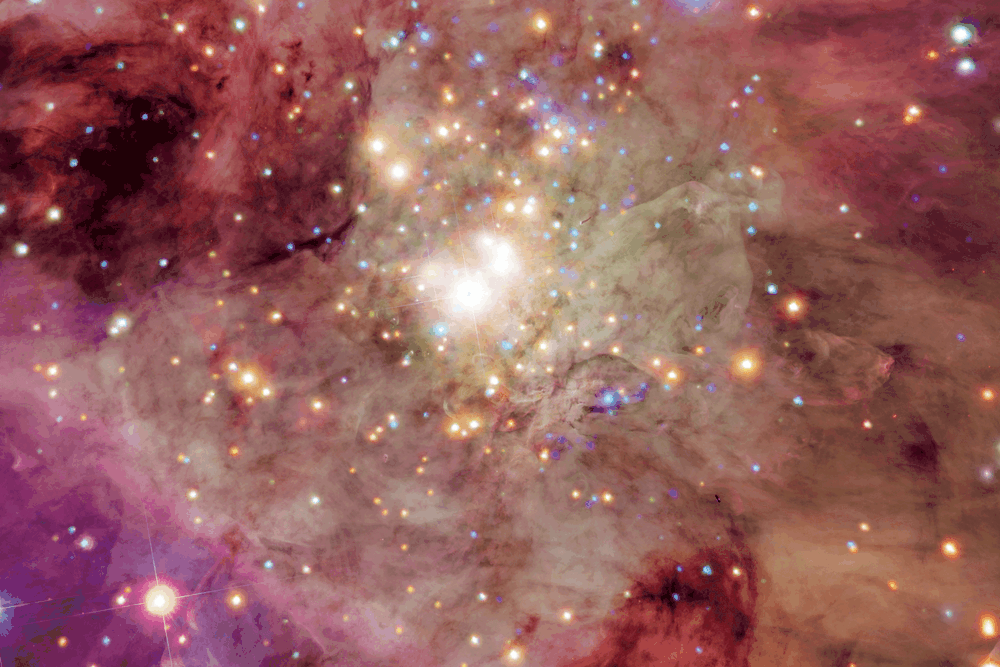
Allen Toussaint (/ˈtuːsɑːnt/; January 14, 1938 – November 10, 2015) was an American musician, songwriter, arranger and record producer, who was an influential figure in New Orleans rhythm and blues from the 1950s to the end of the century, described as “one of popular music’s great backroom figures”. Many musicians recorded Toussaint’s compositions, including “Whipped Cream”, “Java“, “Mother-in-Law“, “I Like It Like That“, “Fortune Teller“, “Ride Your Pony“, “Get Out of My Life, Woman“, “Working in the Coal Mine“, “Everything I Do Gonna Be Funky”, “Here Come the Girls“, “Yes We Can Can“, “Play Something Sweet“, and “Southern Nights“. He was a producer for hundreds of recordings, among the best known of which are “Right Place, Wrong Time“, by his longtime friend Dr. John (“Mac” Rebennack), and “Lady Marmalade“, by Labelle.
The youngest of three children, Toussaint was born in 1938 in New Orleans and grew up in a shotgun house in the Gert Town neighborhood, where his mother, Naomi Neville (whose name he later adopted pseudonymously for some of his works), welcomed and fed all manner of musicians as they practiced and recorded with her son. His father, Clarence, worked on the railway and played trumpet. Allen Toussaint learned piano as a child and took informal music lessons from an elderly neighbor, Ernest Pinn. In his teens he played in a band, the Flamingos, with the guitarist Snooks Eaglin, before dropping out of school. A significant early influence on Toussaint was the syncopated “second-line” piano style of Professor Longhair.
After a lucky break at age 17, in which he stood in for Huey “Piano” Smith at a performance with Earl King‘s band in Prichard, Alabama, Toussaint was introduced to a group of local musicians led by Dave Bartholomew, who performed regularly at the Dew Drop Inn, a nightclub on Lasalle Street in Uptown New Orleans. His first recording was in 1957 as a stand-in for Fats Domino on Domino’s record “I Want You to Know“, on which Toussaint played piano and Domino overdubbed his vocals. His first success as a producer also came in 1957 with Lee Allen’s “Walking with Mr. Lee”. He began performing regularly in Bartholomew’s band, and he recorded with Fats Domino, Smiley Lewis, Lee Allen and other leading New Orleans performers.
more...Grady Bernard Tate (January 14, 1932 – October 8, 2017) was an American jazz and soul-jazz drummer and baritone vocalist. In addition to his work as sideman, Tate released many albums as leader and lent his voice to songs in the animated Schoolhouse Rock! series. Tate was born in Hayti, Durham, North Carolina. In 1963 he moved to New York City, where he became the drummer in Quincy Jones‘s band.
Grady Tate’s drumming helped to define a particular hard bop, soul jazz and organ trio sound during the mid-1960s and beyond. His slick, layered and intense sound is instantly recognizable for its understated style in which he integrates his trademark subtle nuances with sharp, crisp “on top of the beat” timing (in comparison to playing slightly before, or slightly after the beat). The Grady Tate sound can be heard prominently on many of the classic Jimmy Smith and Wes Montgomery albums recorded on the Verve label in the 1960s. During the 1970s he was a member of the New York Jazz Quartet. In 1981 he played drums and percussion for Simon and Garfunkel’s Concert in Central Park. As a sideman he has played with musicians including Jimmy Smith, Astrud Gilberto, Ella Fitzgerald, Duke Ellington, Count Basie, Rahsaan Roland Kirk, Quincy Jones, Stan Getz, Wes Montgomery, and Michel Legrand.
https://www.youtube.com/watch?v=eGA-BQpx5Bo
more...Kenneth Vincent John Wheeler, OC (14 January 1930 – 18 September 2014) was a Canadian composer and trumpet and flugelhorn player, based in the U.K. from the 1950s onwards. Most of his performances were rooted in jazz, but he was also active in free improvisation and occasionally contributed to rock music recordings. Wheeler wrote over one hundred compositions and was a skilled arranger for small groups and large ensembles. Wheeler was the patron of the Royal Academy Junior Jazz course.
Wheeler was born in Toronto, Ontario, on 14 January 1930. Growing up in Toronto, he began playing cornet at age 12, and became interested in jazz in his mid-teens. Wheeler spent a year studying composition at The Royal Conservatory of Music in 1950. In 1952 he moved to Britain. He found his way into the London jazz scene of the time, playing in groups led by Tommy Whittle, Tubby Hayes, and Ronnie Scott.
https://www.youtube.com/watch?v=0t0_heBtX1s
more...“Let me be a free man, free to travel, free to stop, free to work, free to trade where I choose, free to choose my own teachers, free to follow the religion of my fathers, free to talk, think and act for myself — and I will obey every law or submit to the penalty.” Chief Joseph of the Nez Perce

One of the brightest and most massive star-forming regions in our galaxy, the Omega or Swan Nebula, came to resemble the shape resembling a swan’s neck we see today only relatively recently. New observations reveal that its regions formed separately over multiple eras of star birth. The new image from the Stratospheric Observatory for Infrared Astronomy, or SOFIA, is helping scientists chronicle the history and evolution of this well-studied nebula.
“The present-day nebula holds the secrets that reveal its past; we just need to be able to uncover them,” said Wanggi Lim, a Universities Space Research Association scientist at the SOFIA Science Center at NASA’s Ames Research Center in California’s Silicon Valley. “SOFIA lets us do this, so we can understand why the nebula looks the way it does today.”
Uncovering the nebula’s secrets is no simple task. It’s located more than 5,000 light years away in the constellation Sagittarius. Its center is filled with more than 100 of the galaxy’s most massive young stars. These stars may be many times the size of our Sun, but the youngest generations are forming deep in cocoons of dust and gas, where they are very difficult to see, even with space telescopes. Because the central region glows very brightly, the detectors on space telescopes were saturated at the wavelengths SOFIA studied, similar to an over-exposed photo. SOFIA’s infrared camera called FORCAST, the Faint Object Infrared Camera for the SOFIA Telescope, however, can pierce through these cocoons.
The new view reveals nine protostars, areas where the nebula’s clouds are collapsing and creating the first step in the birth of stars, that had not been seen before. Additionally, the team calculated the ages of the nebula’s different regions. They found that portions of the swan-like shape were not all created at the same time but took shape over multiple eras of star formation.
The central region is the oldest, most evolved and likely formed first. Next, the northern area formed, while the southern region is the youngest. Even though the northern area is older than the southern region, the radiation and stellar winds from previous generations of stars has disturbed the material there — preventing it from collapsing to form the next generation.
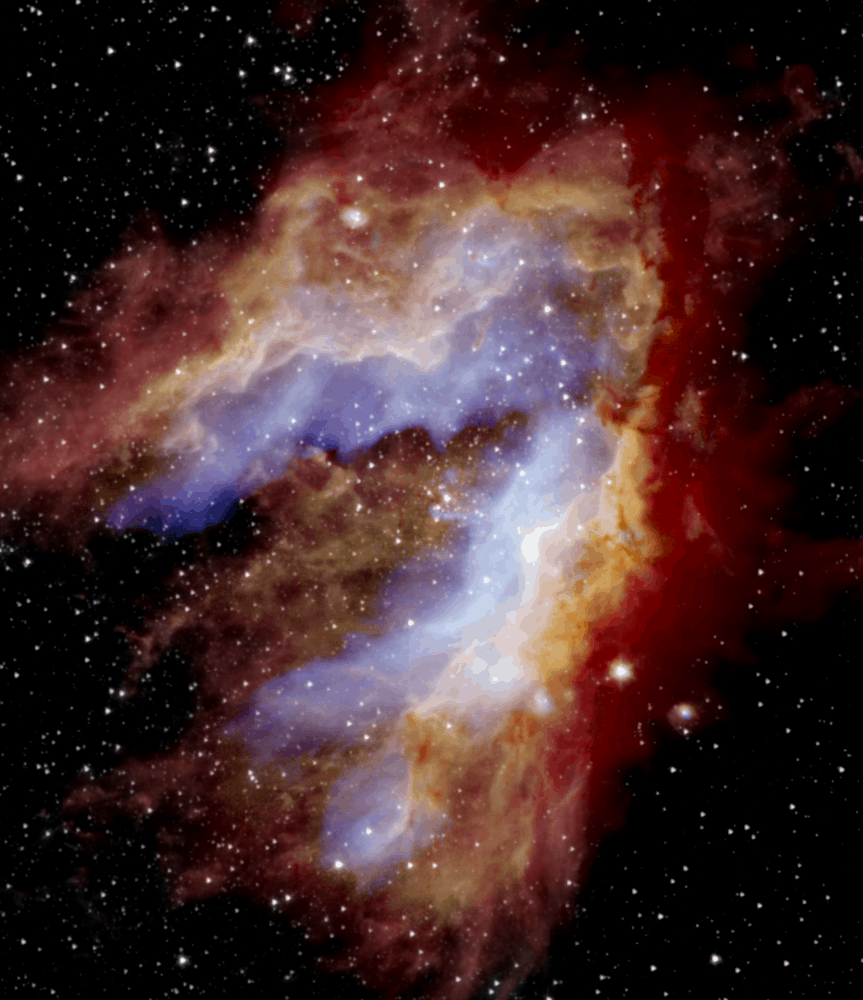
Melba Doretta Liston (January 13, 1926 – April 23, 1999) was an American jazz trombonist, arranger, and composer. She was the first woman trombonist to play in big bands during the 1940s and 1960s, but as her career progressed she became better known as an arranger particularly in partnership with pianist Randy Weston.
Liston was born in Kansas City, Missouri. At the age of seven, Melba’s mother purchased her a trombone. Her family encouraged her musical pursuits, as they were all music lovers. Liston was primarily self-taught, but she was “encouraged by her guitar-playing grandfather” who she spent significant time with learning to play spirituals and folk songs. At the age of eight, she was good enough to be a solo act on a local radio station. At the age of ten, she moved to Los Angeles, California. She was classmates with Dexter Gordon, and friends with Eric Dolphy. After playing in youth bands and studying with Alma Hightower, she joined the big band led by Gerald Wilson in 1944.
She recorded with saxophonist Dexter Gordon in 1947 and joined Dizzy Gillespie‘s big band, which included saxophonists John Coltrane, Paul Gonsalves, and pianist John Lewis) in New York for a time when Wilson disbanded his orchestra in 1948. Liston performed in a supporting role and was nervous when asked to take solos, but with encouragement she became more comfortable as a featured voice in bands. She toured with Count Basie, then with Billie Holiday (1949) but was so profoundly affected by the indifference of the audiences and the rigors of the road that she gave up playing and turned to education. Liston taught for about three years.
more...More Posts
- Voices of Sepharad 4-18-19
- The Cosmos with NGC 1499
- Gene Ammons Day
- Ali Akbar Khan Day
- World Music with Refugees for Refugees
- Daily Roots with the Skatalites
- The Cosmos with NGC 5494/95
- Jack Casady Day
- Eddie Marshall Day
- Bud Freeman Day
- World Music with Mahawa Kouyaté and Soundioulou Cissokho
- Daily Roots with Dennis Alcapone
- The Cosmos with NGC 2237
- Herbie Hancock Day
- Shakey Jake Harris Day
- Hound Dog Taylor Day
- World Music with ENCARNA ANILLO y Juan Diego
- Daily Roots with the Soul Sisters
- The Cosmos with LEDA 89996
- Will Wampach Day
